Saturday, September 29, 2007
Tuyoq: Town in the Flaming Mountains
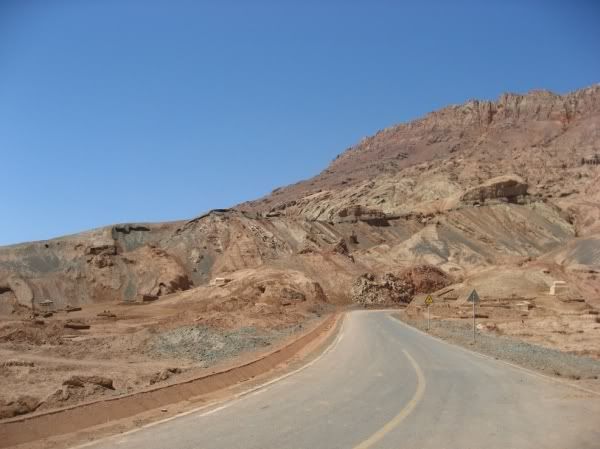
After the Bezeklik caves, we headed to Tuyoq, a small Uyghur grape-producing village nestled in a valley of the Flaming Mountains. Both Lonely Planet and my Chinese guidebook had raved about Tuyoq, claiming that it was little-visited by tourists and offered a truly “authentic” experience. But given so much positive press, I was expecting the place to be overrun by tackily-dressed Westerners and camera-happy Chinese by the time I’d gotten there.
As I bought student-discounted tickets to enter the town (it may sound silly that you have to buy tickets just to enter a town, but that’s how it works), the Uyghur fellow checking my student ID looked up and grinned. He was about my age and sported the infamous Uyghur mullet (more about this hairstyle later). “Ni ye shi 87 nian de?”(You’re born in ‘87 too?)
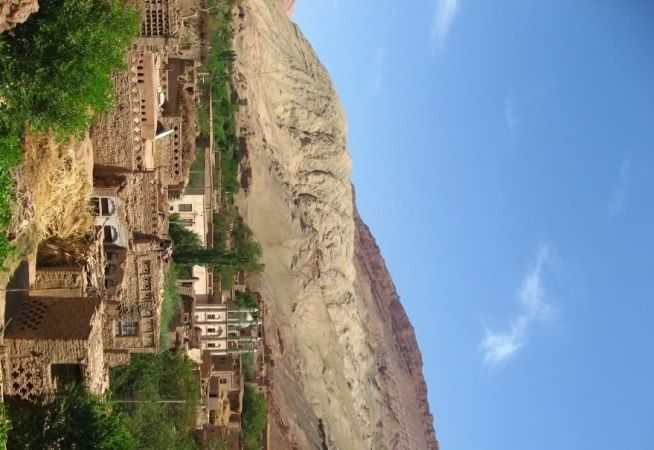
Much to my surprise, Tuyoq really was as serene and untouched as the guidebooks claimed. It was really one of the nicest places I’ve visited in Xinjiang. All the buildings in town were of traditional Uyghur mud-brick architecture, and you could see beds and sofas outside on porches or on the roof – the locals must sleep outside to keep cool at night. I felt a sense of indescribable pleasure just strolling around that town through the little streets. I could have walked around there for hours. It was a peaceful place.
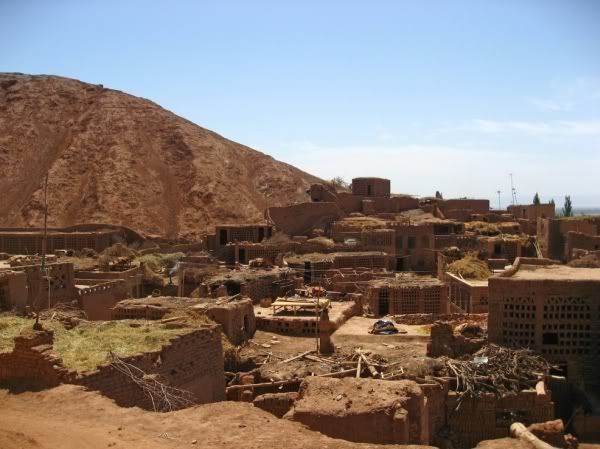
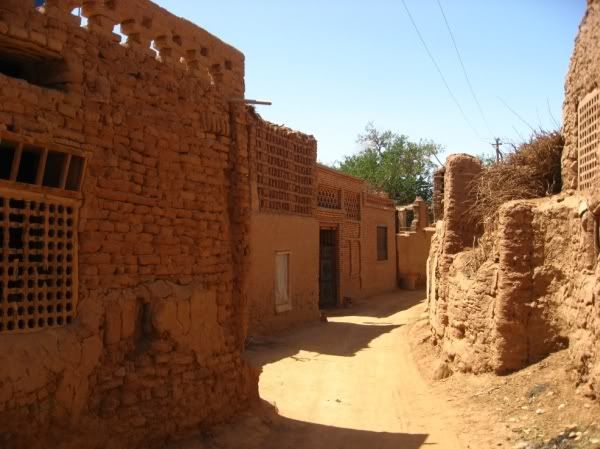
There weren’t too many people walking about town in the afternoon sun, just a few locals, and nobody seemed to notice or mind our presence. The only thing I had regretted was not taking more pictures. The guy selling tickets had forbade me to take pictures in town. But it seems a little strict – I could understand not taking pictures of people, since it’s both rude and offensive to certain Islamic beliefs prohibiting photography, but why not buildings? I managed to sneak in a few shots of the town anyway, as you see, encouraged by the Uyghur tourists who started snapping pictures once nobody was around.
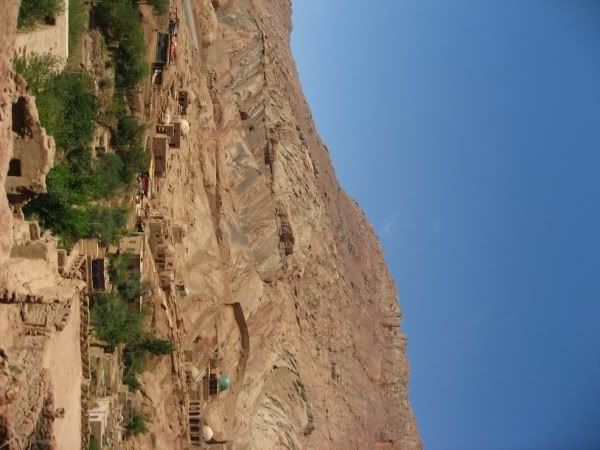
After strolling around a bit, we headed up on a hill overlooking the town, where we could see the mazaar (tomb), supposedly the tomb of the first Uyghur Muslim and an important pilgrimage site for local Muslims. We walked further and noticed a tractor with lots of baskets of green grapes! Turpan is famous for its green grapes, and is the center of grape production in China.

Just as I was looking around for someone to buy the grapes from, a youngish guy in his 20s emerged from the dense grape fields. I grinned, motioned towards the grapes and took out a couple kuai, assuming he didn’t speak any Chinese. He walked over, took up several bunches of grapes, blew the dust off of them, then gave the whole armful to me! I tried handing him the money, but he refused it. “Song gei de!”(it’s a gift), he said, in a thick accent. It was the first time we'd seen such striking contrast - lush, green grapefields surrounded by miles of empty, barren desert. From what I've read, desert soil is actually very rich, it's just that it has no water - so if you can get water to it, it can be very productive.

We walked off down a canyon enjoying our grapes, which were enough to quench our thirst despite forgetting to bring extra water – they say water is plentiful in Xinjiang, after all, it’s just that it takes the form of grapes and melons. Further up along the canyon wall were the Buddhist caves of Tuyoq. There are lots of Buddhist cave sites around Xinjiang, remnants of the Buddhist kingdoms that reigned in the area before the arrival of Islam. Buddhism itself came to China (and eventually the rest of East Asia) through Xinjiang along the Silk Road.
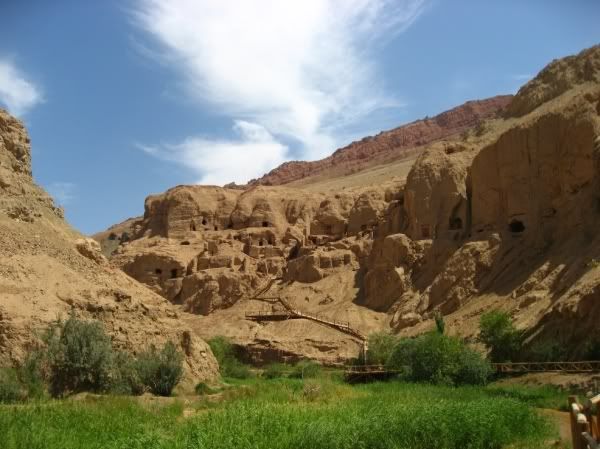
If you're anything like me, getting to explore forgotten Buddhist caves in the desert make you feel tingly all over.

Climbing up to the caves!
Rebecca was a bit too tired to climb up to the caves, but I generally get intrigued by 1)deserts 2)caves 3)ruins 4)any combination of the above, so I eagerly climbed up the rickety old wooden stairs. The place seemed deserted, so I was surprised to find a fellow at the top who checked my ticket and opened up the caves to me to take a look. They were a bit small, and much of the art had been vandalized centuries ago by religious zealots, but it was a nice little place nonetheless.
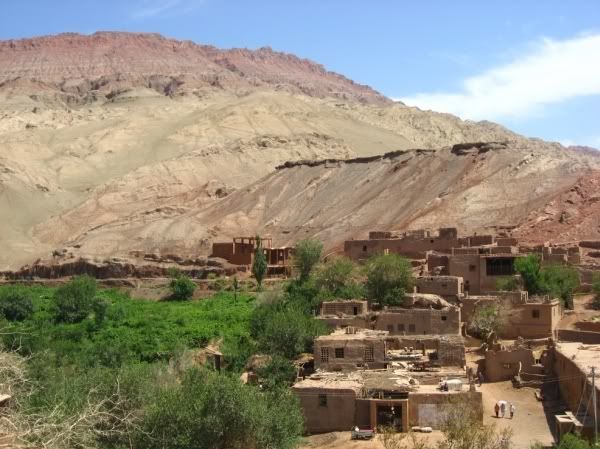
Tuyoq is a spot of green in the middle of miles of barren desert.
Walking back to the town, we bought some water from a pretty Uyghur girl near the entrance who looked exactly like the “traditional” Uyghur girls you see in pictures of minorities – big brown eyes, long braids, wearing a brightly colored, patterned dress and a square cap on her head. I put traditional in quotes because I’ve never actually seen anyone dressing like that apart from at tourist sites – Uyghur women seem to prefer tying bandanas or scarves around their hair (and braids seem quite unpopular too). She spoke some of the best Mandarin I’ve heard from locals of that region, inviting us to sit down and enjoy our water in the shade. As we sat, she directed the little electric fan at us, lamenting the hot weather and offering us even more grapes, although we’d eaten quite enough already.

We climbed up some stairs towards the mazaar we’d seen earlier. A sign said you could pay 25 kuai to visit the mazar, but I had no urge to pay for the privilege of bothering people at a religious site, so we went on further up, meeting the road (I think you could easily enter the town from here without paying anything) and took the photo below, as well as the one at the very top.
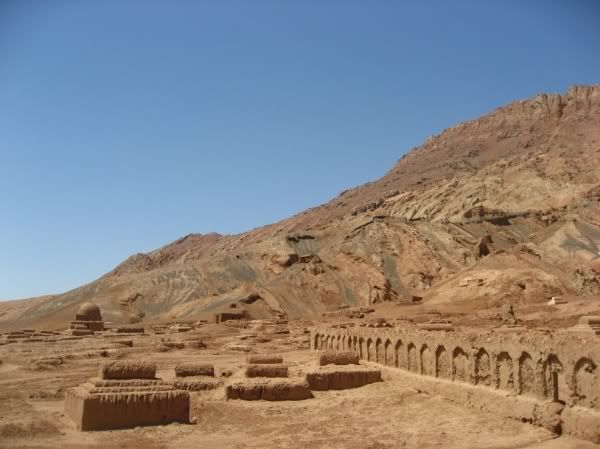
Muslim tombs at the base of the Flaming Mountains.
Finally, we decided we were ready to go and went back to find our driver, who was relaxing in the shade with the ticket selling guy. As Rebecca went to use the bathroom, I had a chat with the ticket seller, who seemed quite curious about me and spoke decent Mandarin.
“What does your dad do?”
”He’s an engineer.”
Here I used the word gongchengshi to refer to engineer, which the guy didn’t know, so our driver(who was Uyghur) translated into Uyghur: ingenir. Perhaps Uyghur wouldn’t be too difficult to learn after all…
“How much does he make?”(this is a common question in China and not considered impolite)
“Uh, he does alright.”
“Gongzi hen gao ba!”(His salary must be really high!) the guy laughed.
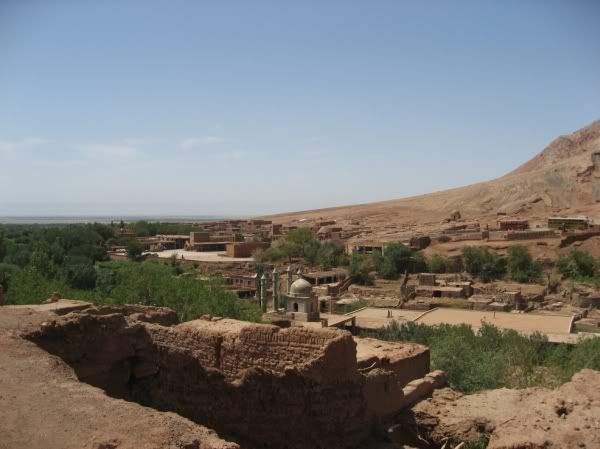
After Rebecca returned, we had lunch with a local family, who served us some laghman, a staple of Uyghur cooking. Laghman(a loanword from Chinese “lamian”) are pulled noodles made fresh, topped with a tomato-based sauce made with meat and peppers. I chatted with the driver a bit and learned another word in Uyghur: rahmat, meaning “thank you”, which I eagerly tried on our non-Chinese-speaking hosts. After lunch our driver suggested I slip a 20 to our host, who gratefully accepted after the obligatory “no, I won’t take it” “no, you must take it” business.
To be continued…
Thursday, September 27, 2007
Turpan, part 2
Having procured breakfast, we headed back to the hotel to plan out our day. According to the guidebooks, most of the sights were actually located in a 45km radius around Turpan, rather than in the city itself. Both books suggested hiring a driver for the day and mentioned a lack of public transport, so we settled on a price of around 250 yuan with one of the many eager drivers around the hotel and set off in his dusty red Santana.

As we left Turpan, we passed the Flaming Mountains, famous for their mention in the travel records of Xuanzang, a Buddhist monk in the Tang dynasty who trekked all the way to India to obtain original Buddhist scriptures. Xuanzang’s route, starting in Xi’an at the Big Goose Pagoda, took him all the way up through Gansu, across Xinjiang, through what is now Kyrgyzstan, Uzbekistan, and Afghanistan, and finally down into India. “Journey to the West”, one of the four classic Chinese novels, was based on his travels, and several popular movies and TV series have been made about the book (which I’ve never read, but must get around to someday, considering someone manages to bring it up at least once any time I discuss Chinese books).

The Flaming Mountains are so-named because of their textured, “flamed” appearance and "reddish" color. They’re actually quite a long mountain range, so you can see them quite far out from Turpan from various sides. After driving across open desert for a while, we began driving through a valley, surrounded on both sides by the Flaming Mountains. Unfortunately, the car had darkly tinted windows, and the thing to roll the windows down was broken, so I didn’t get to take any pictures from the car.

Lonely Planet had talked down the Bezeklik caves, claiming it was “virtually empty”, but I wanted to go anyway – I remember watching a show on the Discovery channel years ago about Xuanzang’s travels, which featured footage of a beautiful Buddhist temple complex in a desert canyon. They didn’t bother mentioning the name of the place, but I thought it was one of those places so cool and faraway I’d never get to see it. But then I saw the picture in my Chinese guidebook and recognized it was the same place!
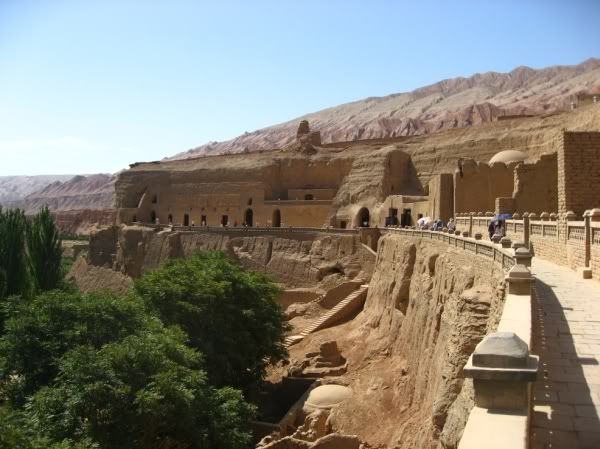
The Bezeklik cave complex was smaller than I thought, but it was still an impressive place. The caves were indeed a bit empty, as they had been plundered by Western “archaelogists”, and many of the faces on the Buddhist paintings had been rubbed off as idolatrous centuries ago by Muslims.

There were plenty of Korean tourists wearing facemasks for some reason. It can get dusty in Xinjiang, although not to the point where you'd need respiratory protection.
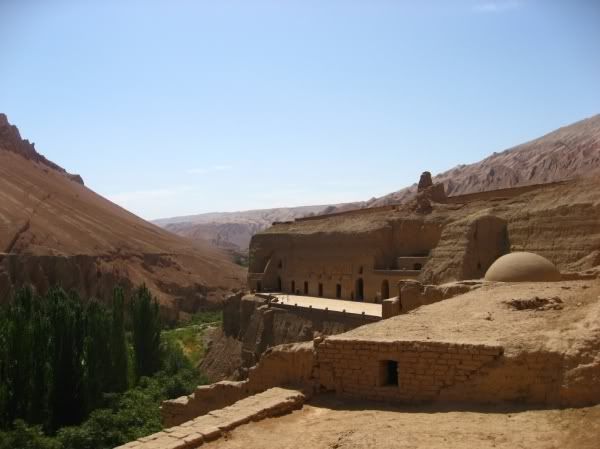
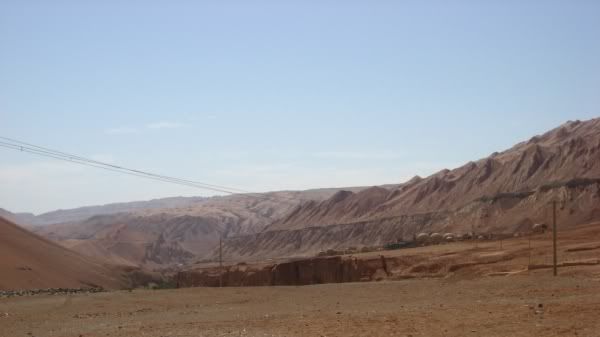
Nevertheless, there was still some interesting cave art to look at, and the place itself is quite visually stunning. Definitely worth a visit!
P.S. Am I the only one who thinks Blogger's default "large" image size is way too small? I had to upload my pics to Photobucket just to get the larger size you see on some of the pics here. Remember, you can always click on a picture to get the larger size.
To be continued…
Tuesday, September 25, 2007
La Belle Province restaurant locations
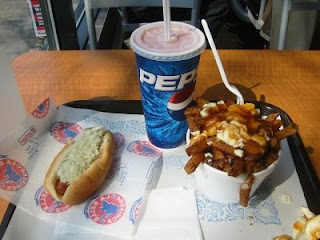
I've noticed a huge amount of people get to my blog by googling "La Belle Province restaurant locations." For some reason I'm the #1 result for this search, despite having no information whatsoever on locations of this fine poutine eatery. I guess it's due to this post a while ago, where I happen to use the term. I can't help but feel a little guilty, as I'm reminded of countless times I've searched for something only to get some worthless blog post. Kind of reminds me of that Anil Dash fellow claiming his victory in that SEO contest was due to "content" even though his blog had no content whatsoever on nigritude ultramarine or whatever the term was.
So here I am providing actual content - lo and behold, the location of every La Belle Province restaurant in Montreal, as presented by Google Maps!
http://maps.google.com/maps?f=q&hl=en&geocode=&q=la+belle+province,+montreal,+CA&ie=UTF8&z=11&om=1
(click the link to get the locations)
I should have a new Xinjiang post up pretty soon - tonight or tomorrow.
Saturday, September 22, 2007
Arrival in Turpan

A busy morning at the bazaar in Turpan. The people here are selling dry nan bread, as opposed to oily nan bread - more on this distinction later.
After a 31-hour train journey, we got off at Daheyan station at sunrise. Turpan isn't actually connected by rail, so if you buy a ticket for Turpan, it actually lets you off at Daheyan, a little town about two and a half hours away by bus. Our guidebooks had told us there would be regular buses to Turpan having started an hour ago, but there were none in sight other than large private buses sweeping up tour groups. A few taxi guys offered to drive us over to Turpan for 60kuai, but I was set on the 7kuai price the guidebooks had mentioned (it’s a difference of about 6 dollars, but you tend to get thrifty in China). One of the taxi drivers from earlier suddenly claimed that he also drove a minibus and would only charge 7kuai, but I was suspicious by now. After asking around, we determined the actual bus station was a good 15 minute walk from the train station; I have no idea why it was located in such an inconvenient place, but for future reference, walk straight ahead from the train station up the street to the intersection, then turn right and walk a good 10 minutes and it'll be the large building on the left.

This is the Daheyan bus station, if anyone in the future plans on visiting Turpan.
We got there just as another minibus had gotten its last passenger and left, so we waited around on the steps watching the sun rise until the next minibus was ready. Our departure was delayed by a local shopowner throwing a tantrum at some female passengers behind us; it was some stupid dispute involving the female passengers having ordered some food, but then leaving before the food was ready to catch the bus (and not paying). The shopowner got her 2 yuan in the end, and our bus set off for Turpan.
That ride to Turpan is one of the strongest memories I have of Xinjiang. We drove out of town a bit, passed a large refinery, then we were out in the middle of the desert. The desert was unlike any I had seen before – flat, barren, and completely devoid of life. Not even the smallest bush could survive there. It’s a hard scene to describe – growing up in New Mexico, I’m used to the deserts being full of life – bushes, cacti, lizards, rabbits – but this completely flat, barren desert was eerily beautiful. I didn’t take any picture of it, but it looked something like this:

This was actually taken on the ride to Urumqi. It was much sunnier and hot on the ride to Turpan, though.
As the bus sped across the desert, I dozed off, the sun rising ever higher over the desert plain.
Two and a half hours later, we arrived in Turpan. Settling on the Transportation Hotel attached to the bus station, we freshened up and went out to get some breakfast at the market we’d spotted across the street.

The bazaar at Turpan.
Stepping out on the street, it was immediately obvious Xinjiang was not like other places we’d been in China. Xinjiang, bordering Pakistan, Afghanistan, and a few other “stans” is in the far northwestern corner of China, encompassing a huge area of territory. Throughout history it has been controlled by many different groups – Mongols, Uyghurs, and Chinese being the main ones – but the majority of the native population is Uyghur. Uyghurs are a Muslim people who speak a Turkic language closely related to other languages of Central Asia, like Kazakh, Krygyz, and especially Uzbek. As far as physical appearance goes, some Uyghurs look more or less like Chinese, whereas others look like Middle Easterners, and some could even pass for Greek or Italian.

Selling bread and having a chat over tea.
Uyghur men wearing black flat caps and women wearing colorful headscarves bustled about on the street. Stands in front of the market sold all kinds of fruit. As we walked in, a few old ladies sitting at the entrance called out at us, pointing at bowls filled with some kind of milky substance. Could this possibly be the delicious fermented wheat, tianmaizi, I’d eaten up in Xiahe? The ladies, grinning, handed us two bowls with spoons that had been used by countless others eating breakfast that morning. Unfortunately, it was not tianmaizi, nor was it very good, in my opinion. It was milk with some sort of soggy breadish thing inside. We finished up our bowls and went inside the market.

Get your milk-and-soggy-stuff right here! You're bound to get diarrhea sooner or later in Xinjiang; why not get it over with at the beginning of your trip?
Vendors near the entrance sold all manner of Islamic headwear; walking further in, we found stands selling freshly baked nan bread and other treats, like samsa, which are roasted pastries with meat inside (not unlike samosas – the word similarity is not a coincidence). Further down were tons of fruit sellers, and a few guys selling fresh fountain drinks. The drinks had a minty, refreshing flavor.

The aroma of freshly baked nan bread is irresistible.

The woman here is making samsas, roast pastries filled with fatty lamb meat and copious amounts of grease. An excellent start to any day!

Samsas tend to be greasy and can make you really thirsty. Wash it all down with a minty fountain drink!
As we walked in the market, I heard Uyghur being spoken all around me for the first time. It’s hard to describe what it sounds like, but to the untrained ear, at times it sounds almost like French, as they share some similar sounds – more on this later! The people in the market I’d bought things from didn’t seem to speak very much Chinese, but they definitely knew how to say “yikuai” and “liangkuai” (1 kuai and 2 kuai, respectively). I even learned my first word of Uyghur – “goi”, which is really just a loanword from Chinese(“kuai”, as in the unit of money). After buying some nan bread and samsas for breakfast, we were ready to start seeing Turpan.
As far as photos go, I'm kicking myself in the butt for not taking more. At the time I remember feeling awkward about pulling the camera out and snapping people going about their daily lives; I got over the feeling later, but as a result I don't have as many pictures from Turpan.
To be continued…
Labels: turpan bazaar market daheyan bus
Monday, September 17, 2007
31 hours to Turpan: Part 3/3

Did I ever mention I once went to Henan province? This is the Longmen grottoes near Luoyang, a place not unlike the Datong caves we visited earlier. It's an impressive place, but personally I preferred the caves in Datong; this place was simply way too crowded.
After a few hours, I decided to check if we could upgrade. There were tons of people sitting and standing in the aisles, so it took me quite a long time of carefully stepping over people's heads before I made it two cars up to the upgrade desk. The guy sitting at the desk was a heavyset man with a kindly, but tired face who reminded me of Sgt. Hong from Chuishiban de gushi(a comedy about a Chinese military kitchen crew).
"Hey, any sleepers?"
It was obviously not the first time he had been asked tonight. Exasperated, he replied that there weren't any.
"What about soft sleeper?(the luxury sleeper class)"
"什么卧都没有!(There aren't any sleepers of any kind!)"
I threaded my way back to our seat, where I had to chase out the guy who had been sitting there earlier. Later on, he noticed there were two inches of seat left next to me, so he sat down, crowding everyone (it's supposed to be three people to a seat). I chased him out again. The remaining 30 hours stretched out ahead of me. Rebecca decided to ask about upgrades (we figured they might be nicer to her, since she's foreign-looking), and was told she could probably get sleepers once we'd gotten to Lanzhou, in the morning at 8:00. Eight hours of sitting isn't too bad, as long as I know I have a bed waiting for me.

Bored in Xi'an? Take a visit to the Han Yang tombs, where you can walk around on glass floors over the tombs! This site has terracotta figures too, much smaller than the famous warriors, but more varied, with court officials, soldiers, commoners, and livestock.
Needless to say, I didn't sleep all night. I had another game of "get the hell off my seat" with a younger woman. Ordinarily, I would feel a bit bad about chasing a younger woman out from the seat, but hours of crowded train travel really get on your nerves. Hey, if she wanted to sit down, she should have paid for a seat like I did!
At 6AM, Rebecca went up to ask about upgrades, figuring she'd get in line early to beat the crowd when we got to Lanzhou. Hours went by. The two babies in the seat across from us woke up and started screaming. Lanzhou came and went. I sat giddily expecting Rebecca to come back with two fresh sleeper tickets. More hours went by. Finally, around 11AM, she came back empty-handed. There were no sleepers, she said, and everyone who had been waiting at the desk had given up and gone back. I was crushed.
A couple hours later, I went up to the desk and asked. The guy sitting at the desk had a friendly face and looked more Middle Eastern than Chinese.
"Any sleepers?"
The man grinned and shrugged, shaking his head. "Where are you headed?" he asked.
"Turpan."
"Oohhhh! I feel your pain! Look, buddy, there'll be an announcement once we have sleepers. Just sit down and take it easy until then, OK?"
I wasn't going back to my seat without getting a sleeper, so I decided to stand there and wait. A woman in her 30s came to sit at the upgrade desk. Stations came and passed. Several people came by to ask about sleepers, but there were none. The woman looked Chinese and spoke just like a Chinese, but she had very green eyes. Eventually, the number of people crowding around and peeking over her shoulder to read the records she was writing got to her.
"For heaven's sake there aren't any sleepers! Go back to your seats already!"

The "forest of steles" at the Shaolin temple in Henan province. It's a pretty touristy place, but the kung fu show is impressive.
The crowd murmured with discontent. "So many people got off at Lanzhou, how couldn't there be any sleepers?" "Hey, I heard they were selling sleepers last night!" "Somebody told me they HAVE sleepers, they just won't sell them!" Confronted by several angry passengers, the lady finally explained the situation: yes, people were getting off, but stations up ahead have priority to sell the sleeper tickets. They weren't going to risk selling sleepers now, only to have people getting on later find someone already in their bunk. After reaching certain stations (which she wouldn't divulge), they could free up the sleepers if there were any left over. Contented with the explanation, people started going back. Except me, of course. I stayed standing there, even when the heavyset guy from last night, looking sympathetic, suggested I just go back and wait. I noticed he had green eyes too, despite looking Chinese. Although there were no sleepers, there were plenty of empty seats to be sold to people who had bought standing tickets.
A fellow handed over a couple hundreds and asked for a seat ticket. The heavyset guy, as most people do when accepting 100's, gave them a few rubs to check for authenticity. "Hmmm, this one feels a bit thick..." The guy offered another 100. "Try this one!" Other guys buying tickets intentionally handed over more 100's than needed, hoping the ticket guy would screw up and take a fake one.

Touristy, but fun - you can rent bikes up on the Xi'an city walls and ride all the way around. It takes a bit over an hour.
Eventually, I went back to my seat. We'd already spent almost 15 hours on the train, so we were halfway done. We stopped at another big station, Zhangye, and a lot of people got off. We had to wait for about half an hour before starting up again. This could be the big stop - but by now, my hopes were dashed and I was tired of asking, so I stayed in my seat. The car was much less crowded now - all the country Jethroes who hadn't actually bought seat tickets were now happily sitting in the freed-up seats, unharassed by angry ticket owners. If only the situation were the same for sleeper bunks, I thought.
After another half hour, there was a sudden announcement over the intercom. A sweet female voice speaking extremely standard Chinese was happy to inform us that...yes, the sale of sleeper tickets was beginning in car 12!!!
I bolted out of my seat and jumped over the people sitting in the aisle, racing up to the upgrade desk I knew so well. As I neared car 12, I noticed a huge amount of people crowded together, pushing each other. Something told me they weren't in line for the bathroom.

What better way to spend a lazy Sunday afternoon than playing a game of Chinese chess with your buds?
When they say people don't queue in China, they don't mean they NEVER queue. People queue up in supermarkets, at the rail ticket window, and even for the Line 13. But after you've been sitting in a crowded hard seat compartment for 15 hours, it's every man for himself. I waded into the crowd, edging my way towards sleeper bunk heaven. Someone had procured sleeper tickets! He pushed his way through the crowd, who made way for him, and a gap appeared. Everyone started pushing and shoving like mad, me included. I managed to take full advantage of the opening, having shoved several guys behind me, and was close enough to take a fistful of 100's out and wave it at the guy at the desk, as many others were doing.
"Stop pushing! There's enough for everyone!" The heavyset guy's words fell on deaf ears. The struggle to get to the desk continued. "Ahh, that's our typical Chinese competitive spirit for you," he sighed. Noticing my ruthless fight to get to the desk, he chuckled with approval. "And this young fellow isn't letting anyone get ahead of him. He's actually a foreigner - Korean - you know that?" he said, talking to another rail worker. For some reason all Chinese who have realized I'm a foreigner think I'm Korean. Trust me, brother, even us fake Koreans aren't letting anyone get sleepers before we do.

Us fake Koreans enjoy a good Korean BBQ from time to time. Freshly grilled bulgogi wrapped in lettuce, with a dab of fermented soybean paste and a slice of fresh garlic - heavenly.
I got the sleepers! As I pushed through the crowd back to my seat, sleeper tickets held victoriously over my head, people in the crowd started asking me, "Hey, how much did those cost?" "How many did you buy? Only 2?!" "How many are left?"
Compared to the seats, the hard sleeper compartment was paradise. I lay back, relaxed, and pulled out a copy of Duzhe(Chinese Reader's Digest) to pass the remaining 15 hours. The rest of the ride was uneventful. A lady noticed my Xinjiang guidebook(written in Chinese) and asked to take a look, curious. The guy in the bunk across from me struck up conversation with me. We chatted for a bit about Xinjiang. He asked where Rebecca was from. She mentioned she was Swedish, and I added that I was from the US. He was quite surprised that I was from the US - "I thought you were her tour guide!" We chatted some more about China - I mentioned I wanted to come work here in the future. Excited, he told me a story.
"This country has changed so much. 10 years ago, my wife fell ill and I went bankrupt paying her hospital bills. I was working every day hand-to-mouth just to get by. But everything has changed since then. I might not be rich now, but I have my own business and I'm doing pretty well." He gave me his QQ number(QQ is an instant messaging service everyone in China uses) and told me to add him once I got back to the US.
I got my first real sleep since getting on the train. We were passing through northwestern Gansu, and I noticed the scenery looked just like southern New Mexico, with rocky, bush-covered desert. Near sunset, we made a short stop in a little station and got some ice cream from vendors at the platform. We had a meal in the restaurant car - the food was awful, but I liked the ambiance.

Rebecca in the restaurant car.
The next day at 5AM, a rail worker woke us up to get ready to disembark in an hour at Turpan. The sun rose over the flat, empty desert of Xinjiang.

Saturday, September 15, 2007
31 hours to Turpan: part 2

Coming at you all the way from Chongqing, 重庆盆盆虾("Chongqing Crayfish") specializes in delicious, mouth-numbingly spicy Sichuan-style crayfish. The restaurant provides you with gloves so you don't burn your hands, I guess.
Although our train didn't leave until midnight, we got to the station several hours in advance. Now, there's no security at Chinese train stations apart from a mostly unattended X-ray machine at the entrance, but we were hoping to get a good position in the queue to board the train. I never understood before why people would stand around and queue an hour before the train left, but it made sense now: if you want to upgrade your ticket, you have to be the first one to jump on the train and run to the upgrade desk. On Chinese trains, you can upgrade your ticket to any class as long as there are spots available; you pay only the difference between your ticket and the higher class.
There were plenty of people sitting around on newspaper outside the train station, as usual. Why the newspaper? You see, people in China hate getting their butts dirty, and have a thing about sitting on the ground or even public benches. I remember one time we all decided to sit down in a park gazebo, and a friend handed out pages from a newspaper to everyone. I guess I looked pretty daft when I sat down and started reading the paper while everyone else used it to protect their butts. This is probably why squat toilets are so much more common than sitting toilets in public restrooms - I'm personally a fan of the squatters, I never did like having to sit on toilet seats everyone else has been sitting on! But anyhow, given the amount of spitting and littering that goes on in most Chinese cities, you'd probably want some newspaper too.

Waiting to get on the train to Turpan. Something tells me we aren't going to get those sleeper upgrades...
I was confident that three hours in advance would be enough, but it wasn't. The entire waiting room was packed full of people waiting for the train up to Xinjiang. We set down our packs and wondered if we would get any sleep for the next 31 hours. But looking at tickets people around us were holding, we realized we were lucky – many people had standing-only tickets all the way to Korla, over 40 hours away! If there are no seats left or you can’t afford it, you can buy a standing or “no-seat” ticket. You can even buy a platform ticket – which you’re supposed to use to get on the platform to see people off – and jump on the train and ask for an upgrade, at least according to the folks at Ask Baidu.
Since we'd been so busy packing and getting to the station early, we hadn't eaten. I went out to get us something to eat, only to find a literal wall of packed people trying to get on another train. It took me literally 20 minutes just to walk about 20 feet through the densely packed crowd. Needless to say, the train station food vendors were out of the question, hidden behind the masses of train passengers. I finally got out of the train station, only to find there was nothing to eat around - nobody selling fast food from carts, or anything. And so, I did something I never imagined myself doing, and went into Dicos, the only open restaurant in the vicinity of the train station.

Dicos is a fast-food restaurant chain selling the usual chicken burgers and other American-style fast food. What's special is that it's a homegrown Chinese brand, although you would never guess by looking at it - it looks like any other Western fast-food chain, and is just as expensive! Western fast-food in China is just as expensive as it is in the US, so when you consider the average Chinese person’s purchasing power, it's ridiculously expensive for what you get (and another reason why the Big Mac Index is bullshit, although I guess nobody actually takes it seriously). I mean, who would pay 30 kuai(about 4 dollars) for a burger and fries when you can get a big bowl of beef noodles for 4 kuai(50 cents)? At any rate, people here still eat it, especially spoiled kids (and their parents) who have been brainwashed by foreign corporations into believing that anything Western must be good.
After picking up two combo sets of chicken burgers, I went to buy us some fruit for the trip before heading back. Sitting on our packs in the train station, we had our first (and only) American fast-food meal in China, which was pretty unremarkable. That’s the other weird thing about American fast food in China: the most popular entrée is chicken burgers(like McChicken). Peering in the windows of McDonalds, it would seem they don’t actually sell beef burgers. Even KFC seems to only be selling chicken burgers, as opposed to actual pieces of fried chicken. I might be wrong, though, as I have never eaten there.

Up on the Xi'an city walls. The city walls surround the entire city center and are about 13km long.
After getting on the platform, though, it was an entirely different story, as masses of people rushed to their train compartments. We tried the "help us, we're foreigners who can't take hard seat" spiel, but the most help the rail attendants could offer was telling us the compartment number were you could upgrade tickets. The guy in charge of that compartment simply barked "I'm telling you, we don't have any sleepers!" and told us to board at the compartment our seats were in. After all, Xi’an was the starting point of this train, so our chances of scoring a sleeper from someone who canceled at the last minute were highly unlikely.

Missing your Korean homeland? Kimbap Sarang (at the Jiaoda campus SE gate) has you covered with lots of varieties of kimbap and the icy cold grapey goodness that is Bong Bong grape drinks. There are a couple of other Korean restaurants in the campus area. Note: I'm not Korean, though I'm often told I look like one!
"Hey, mister, these are our seats."
"(grumble)"
"Show us your ticket!"
"(grumble)"
After much convincing, the guy begrudgingly obliged and took a standing position among the tons of people in the aisles who hadn't bought a seat. The train pulled out of Xi’an station. Only 31 hours left to Turpan…
